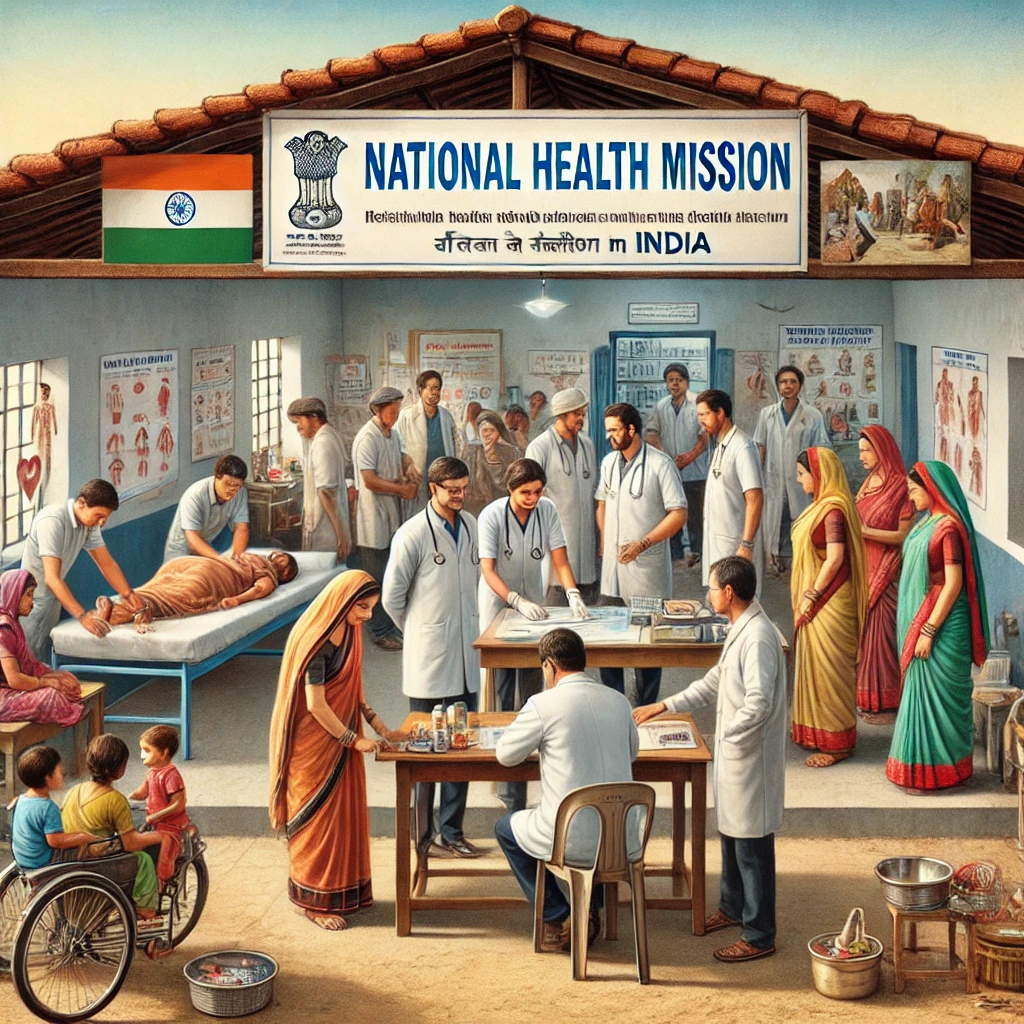The National Health Mission (NHM) is a significant initiative by the Indian government aimed at improving healthcare access and quality across the country. Launched in 2013, NHM integrates the National Rural Health Mission and the National Urban Health Mission, focusing on health system strengthening in both rural and urban areas. The mission seeks to provide universal access to affordable, quality healthcare services that meet the needs of all citizens. The following are some of the key goals of the National Health Mission.
- Total Fertility Rate (TFR) – Aims to lower it to 2.1
- Infant Mortality Rate (IMR) – Strives to decrease it to 25 per 1000 live births
- Maternal Mortality Rate (MMR) – Aims to reduce it to 1 per 1000 live births
- Aims to reduce the incidence of malaria to less than 1 per 1000 population.
- Aims to prevent and decrease anemia in women aged between 15 years to 49 years.
- Strives to halve the incidence and mortality rate of tuberculosis.

What is the National Health Mission (NHM)?
The National Health Mission (NHM) was launched in 2013 to provide accessible, affordable, and quality healthcare services to all. It integrates the National Rural Health Mission (NRHM) from 2005 and the National Urban Health Mission (NUHM) from 2013. NHM aims to strengthen health systems in both rural and urban areas, focusing on Reproductive-Maternal-Neonatal-Child and Adolescent Health (RMNCH+A), communicable and non-communicable diseases.
NHM was launched by the Government of India in 2013, subsuming the NRHM (2005) and NUHM (2013). Its main programmatic components include health system strengthening, RMNCH+A, and communicable and non-communicable diseases. The mission aims to achieve universal access to equitable, affordable, and quality healthcare services that respond to people’s needs.
Support to States & Union Territories (UT)
NHM provides comprehensive support to States and Union Territories (UTs) to enhance healthcare facilities and services. This support includes setting up new health facilities, upgrading existing ones, and addressing infrastructure gaps. Additionally, NHM offers a range of free health services catering to various needs.
Health Facilities
NHM assists States and UTs in establishing new health facilities and upgrading existing ones based on their specific needs. This support aims to bridge infrastructure gaps and ensure the availability of necessary healthcare amenities to improve service delivery across the country.
Health Services
NHM provides a range of free health services, including maternal, child, and adolescent health, family planning, and universal immunization. It also addresses diseases such as Tuberculosis, Malaria, Dengue, Kala Azar, and Leprosy, ensuring comprehensive healthcare support for diverse health needs.
Major Initiatives Supported Under NHM
NHM supports various initiatives aimed at enhancing healthcare delivery across the nation. These initiatives focus on providing essential health services, ensuring quality standards, and improving access to healthcare, particularly in rural areas.
Janani Shishu Suraksha Karyakram (JSSK)
JSSK aims to provide free services to pregnant women and sick infants. This initiative ensures that healthcare services related to childbirth and early infancy are accessible without financial burden, thereby promoting maternal and child health.
Rashtriya Bal Swasthya Karyakram (RBSK)
RBSK focuses on child health screening and early intervention services. It targets children for health issues that can be addressed early to prevent long-term consequences, ensuring better health outcomes for the younger population.
Free Drugs and Free Diagnostics Service Initiatives
These initiatives aim to reduce out-of-pocket expenditure (OOPE) by providing essential medicines and diagnostics free of charge. This effort ensures that financial constraints do not hinder access to necessary healthcare services.
PM National Dialysis Programme
The PM National Dialysis Programme provides free dialysis services to patients with kidney disease. This initiative ensures that individuals suffering from chronic kidney conditions receive essential treatment without financial hardship.
National Quality Assurance Framework
This framework ensures that public health facilities adhere to quality standards. By focusing on quality assurance, NHM aims to enhance the efficiency and effectiveness of healthcare services provided to the public.
Mobile Medical Units (MMUs) & Tele-consultation services
MMUs and teleconsultation services improve healthcare access in rural areas. These initiatives ensure that remote populations receive timely medical attention, bridging the gap in healthcare delivery across different regions.
Ayushman Bharat
The Ayushman Bharat national health protection mission aims to provide comprehensive healthcare coverage to offer a robust healthcare system. This initiative focuses on preventive, promotive, and curative healthcare services, ensuring holistic health benefits.
Pradhan Mantri Jan Arogya Yojana (AB-PMJAY)
AB-PMJAY offers health insurance and financial protection to vulnerable populations. It covers a wide range of medical services, ensuring that financial constraints do not impede access to necessary healthcare.
Achievements of NHM
NHM has made significant strides in improving health indicators and infrastructure development across India. Its efforts have led to notable achievements in maternal and child health, growth in public health facilities, and equitable healthcare development.
Improvement in Health Indicators
NHM has significantly improved health indicators such as maternal mortality ratio, infant mortality rates, and under-five mortality rates. These improvements align with the Millennium Development Goals and Sustainable Development Goals, reflecting accelerated progress in India’s health outcomes.
Growth in Public Health Facilities
NHM has expanded public health facilities, establishing Health & Wellness centers and District Hospitals. This growth enhances the service delivery capacity, providing comprehensive primary and secondary care to citizens.
Equitable Development
NHM focuses on equitable healthcare development, addressing the needs of tribal populations, those in left-wing extremist areas, and the urban poor. Initiatives like the Aspirational District Program allocate additional resources for capacity enhancement in underdeveloped regions.
National Ambulance Services
The establishment of national ambulance services under NHM has significantly improved emergency response capabilities. With 20,990 Emergency Response Service Vehicles and 5,499 patient transport vehicles, NHM ensures free pickup and drop-back services for pregnant women and sick infants.
Human Resource Augmentation
NHM has bolstered healthcare human resources by engaging doctors, nurses, and health workers. The Accredited Social Health Activists (ASHAs) program, involving over 10 lakh volunteers, enhances community health outreach and service delivery.
Health Sector Reforms
NHM has facilitated health sector reforms focusing on governance, procurement, and technology. These reforms aim to improve the efficiency and effectiveness of healthcare services, ensuring better health outcomes for the population.
Addressing high Out-of-Pocket Expenditure (OOPE)
NHM addresses high OOPE by implementing free drugs and free diagnostic services initiatives. The National List of Essential Medicines and Essential Diagnostics Lists are periodically updated, ensuring access to essential healthcare services without financial burden.
Conclusion
In conclusion, the National Health Mission has significantly transformed India’s health landscape. By bridging infrastructure gaps, enhancing service delivery, and focusing on equitable access, it has laid a strong foundation for resilient health systems. As future civil servants, understanding these reforms is crucial for ensuring sustained progress in public health and achieving the broader goals of social justice.


